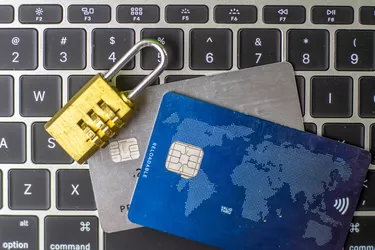
CVN is an acronym for "card verification number" used to assist merchants with fraud prevention. The credit card CVN is a three-digit number on the back of the credit card for MasterCard and Visa, and is a four-digit number for American Express.
Online Antifraud
Video of the Day
When a consumer makes a purchase online or on the telephone, merchants use antifraud measures to make sure that theft of the credit card does not occur. The most common antifraud measure used by retailers is to verify the credit card billing address through an address verification service (AVS). Since the AVS method is not foolproof, many retailers use the CVN as additional antifraud protection.
Video of the Day
CVN Advantage
The advantages in asking for a CVN number is that the number does not print anywhere on a credit card receipt. This prevents a thief from picking up a dropped credit card receipt and using the card number, since a person must be in possession of the credit card to have the CVN number. When CVN use is in combination with AVS, the antifraud measures are more powerful.
Acronyms
The method of card verification has many names, and CVN is just one of them. The merchant may ask for the card security code (CSC), the card verification value (CVV or CV2), the card code verification (CCV) or the card verification code (CVC). All of these codes apply to the same three- or four-digit number imprinted on the credit card.
Where to Find
MasterCard, Visa and Discover have the CVN number printed on the back of the credit card. On the back of each card is a series of numbers that vary in length for each credit card vendor. The last three numbers in this string are the CVN for the credit card. American Express prints its four-digit number on the front of the credit card in black lettering that is not embossed. If a person cannot read the CVN due to wear, he should call the financial institution to correct. Most financial institutions will issue a new card in this case, since purchases can be difficult without the CVN.